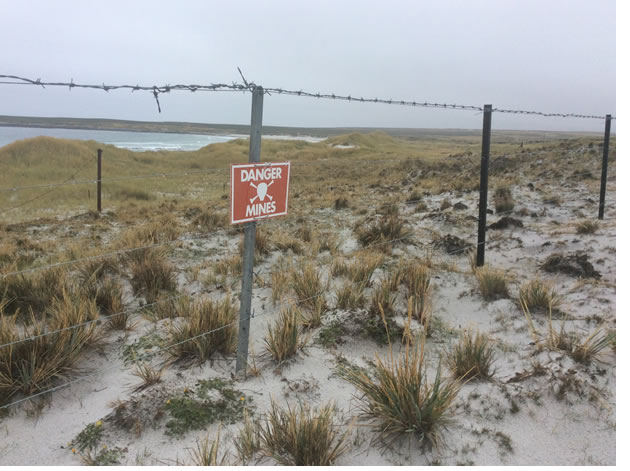Chiswick Resident Leads De-Mining Project In Falklands
A two year task to remove over 25,000 devices from the war thirty five years ago

|
Despite the Falklands War ending over 35 years ago, several thousand square metres of the islands, including a number of beautiful beaches, still remain behind barbed wire fences which contain thousands of land mines laid by the Argentinean troops in 1982.
John Stroud-Turp, a long time Chiswick resident, recently returned from a 6 week spell in the Falkland Islands, managing the humanitarian demining project. The project, sponsored by the Foreign and Commonwealth Office, is set to last another two years, during which John will deploy for further 6 week periods. It is estimated that the Argentineans laid some 20,000 anti-personnel mines and up to 5,000 anti-vehicle mines, this combined with weather and terrain makes the demining project a challenging task.

Part of John’s task was to verify that all the mines had been removed
from each minefield before authorising the removal of the warning signs
and passing the land back to its original owners. John also developed
and authorised the clearance plans for each minefield. Planning the clearance
of each minefield is similar to detective work, it involves putting together
any Argentine records with accounts from locals and British soldiers overlaid
with military judgement.
Although machines are used to ‘break in’ to the minefields once the mine patterns have been established, the mines are then removed by hand. The work is planned in extreme detail and closely managed, as at the end of a clearance the land owner must be given a 100% assurance that the land is now safe to use.
John recently retired after 36 years’ service in the Army. During his final tour of duty he was a member of the UK’s delegation to the UN in Geneva and New York dealing with arms control and weapons limitation treaties, one of which was the UK’s obligations under the International Mine Ban Treaty; better known as the Ottawa Convention.
He now works as a project management consultant and trustee;
he also sits as a magistrate in London and he was recently selected to
run as a Labour Party candidate in the forthcoming local elections.
March 31, 2018